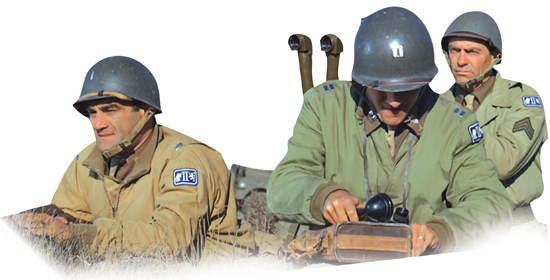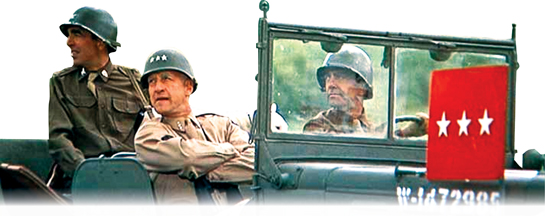|
 Film review Film review
Patton capturing the essence of an indomitable warrior
By Dilshan Boange
Many are the films set during the time of the World War II. Some of
these films are based on key operations and battles that marked the
course of the war such as The Battle of the Bulge whilst some others are
created around central figures in the war such as Patton. Directed by
Frankling J. Schaffner, Patton is a biopic created in 1970.
The start of the film can be treated as a solo performance or
monologue which delivers a speech by General George S. Patton played
strikingly by George C. Scott. An eye catching element in the scene is
the massive US flag forming the background.
The narrative shifts to North Africa, to the beginning of 1943, where
Patton takes charge of the American II Corps in North Africa after the
humiliating defeat at the Battle of the Kasserine Pass.
Strictly instilling discipline in rank and file, he leads the
American II Corps to victory at the Battle of El Guettar, though he is
bitterly disappointed to learn later that Germany’s maverick Field
Marshal Erwin Rommel, whom he respects greatly as a general, was not his
opponent.
 After the North African success, Patton is made a central figure in
the plans for the Allied invasion of Sicily. The proposal to land
Patton’s Seventh Army in the northwest of the island is rejected in
favour of the more watchful plan of British General Bernard Montgomery.
The plan needed the British and American armies to land side-by-side.
Frustrated at the slow progress of the campaign, Patton defies orders,
racing northwest to capture the city of Palermo and then narrowly beats
Montgomery in a race to capture the port of Messina in the northeast.
Patton’s aggressiveness becomes the factor of considerable disaffection
among his subordinates. After the North African success, Patton is made a central figure in
the plans for the Allied invasion of Sicily. The proposal to land
Patton’s Seventh Army in the northwest of the island is rejected in
favour of the more watchful plan of British General Bernard Montgomery.
The plan needed the British and American armies to land side-by-side.
Frustrated at the slow progress of the campaign, Patton defies orders,
racing northwest to capture the city of Palermo and then narrowly beats
Montgomery in a race to capture the port of Messina in the northeast.
Patton’s aggressiveness becomes the factor of considerable disaffection
among his subordinates.
A significant event finally thrusts Patton to be relieved of command
for slapping and threatening to shoot a shell-shocked soldier, whom he
accuses of cowardice, in an Army hospital.
Patton soon fears he will be left out of the historic D-Day invasion
which will be a drawback to his career and prestige. He implores his
former subordinate, General Omar Bradley, for a command before the war
ends. Being in command of the Third Army Patton lives up to the task and
rapidly sweeps across France.
The film ends with Patton walking his dog, a bull terrier, and once
more delivering a monologue which speaks of how glories won by war
heroes are not meant to be eternal. The film gives an account of how
Patton was an outspoken and brash character brazenly defying orders and
indulged in the limelight which was seen as unbecoming of a military
officer whose obedience was required strictly by his superiors in the
White House.
Patton is also thus a good depiction of how the much celebrated
military figure of the US saw himself in a class of persons who ought
not be bound by the norms of civilian leadership, and believed instead
that his was a life of service as a warrior bound to destiny.
|

